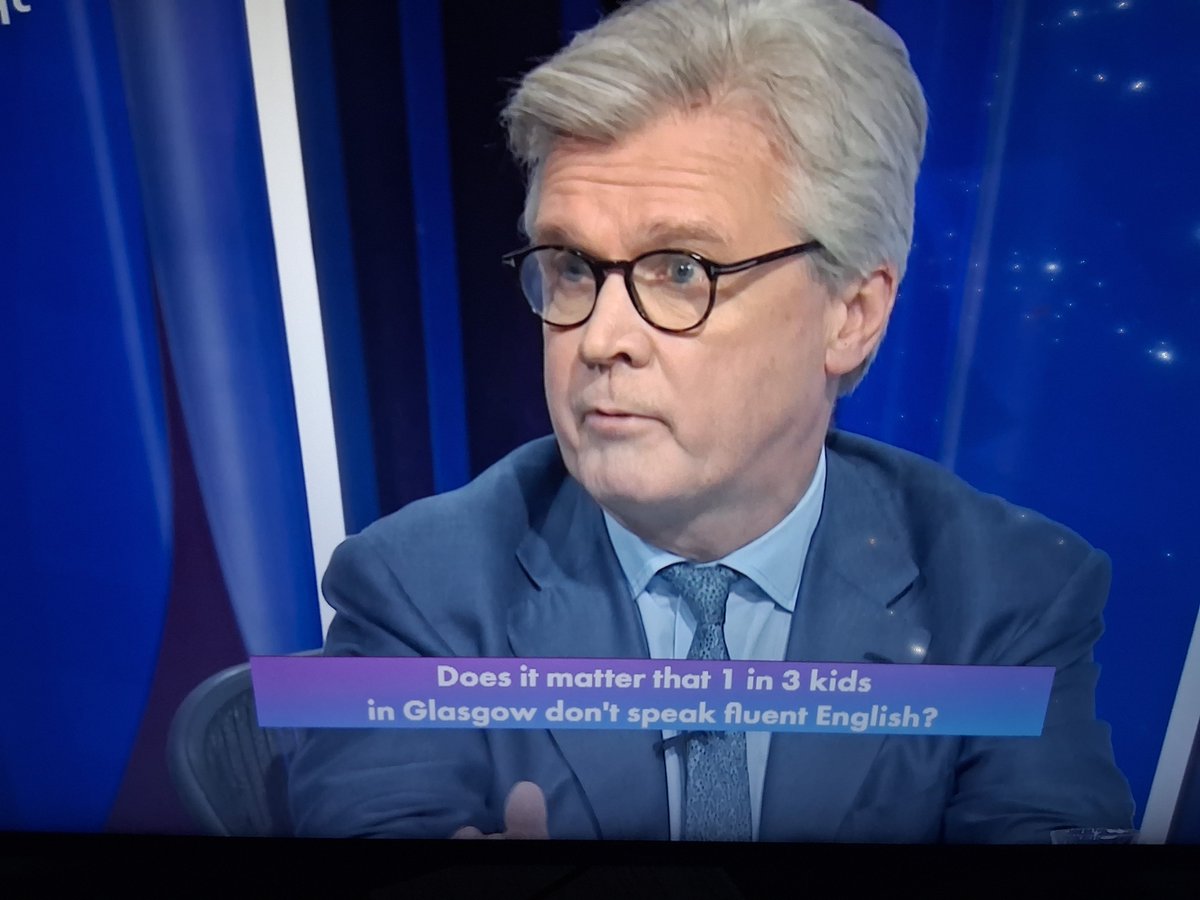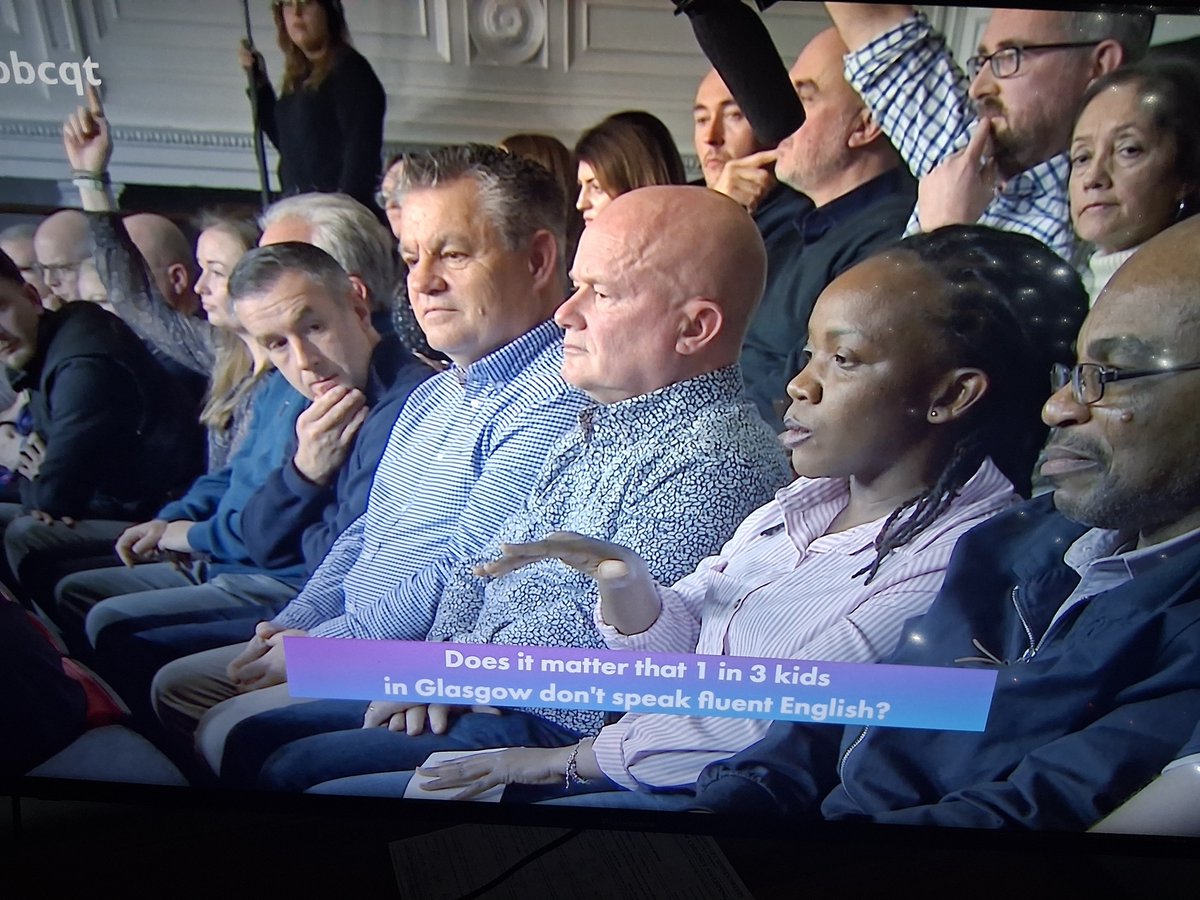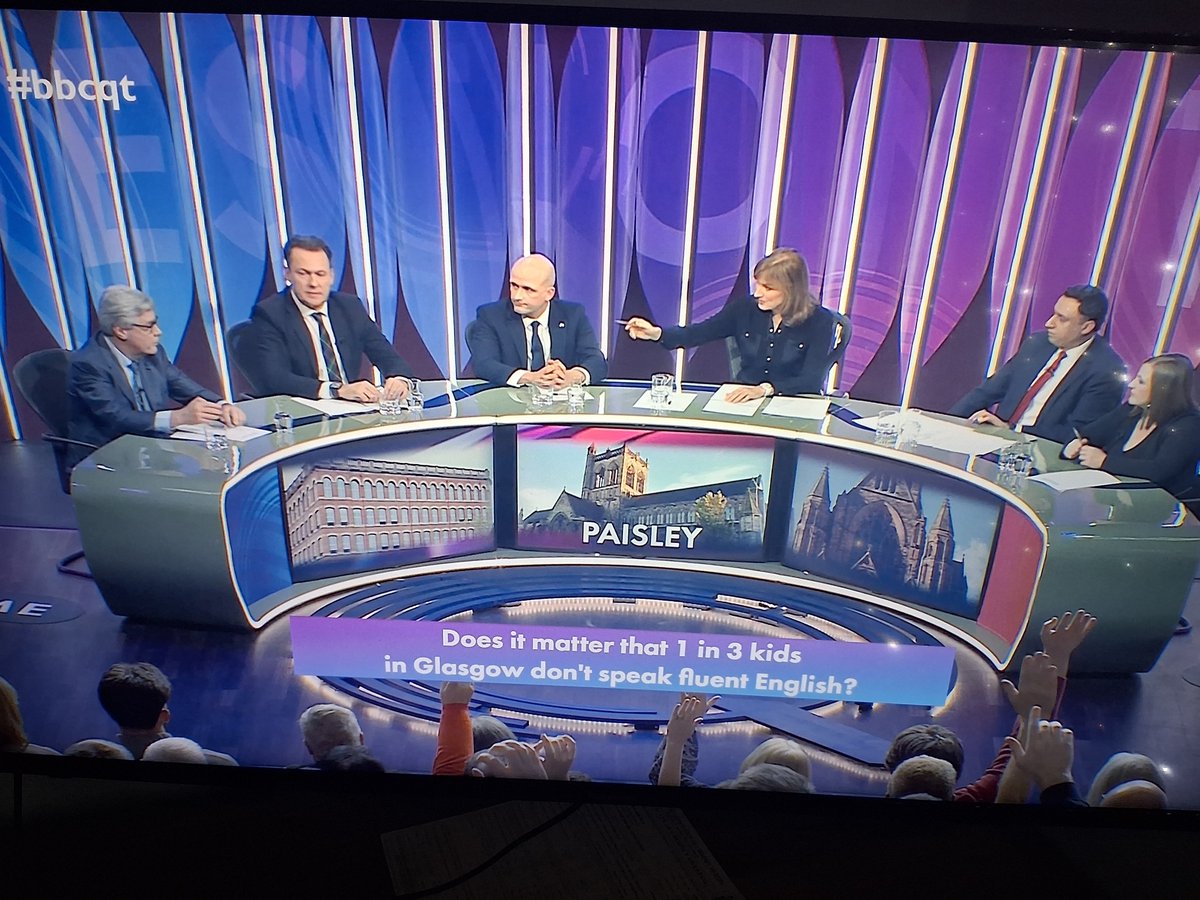Govt is likely to announce record levels of net migration (in a fortnight). Why?
(1) 2022 net migration exceptionally high for exceptional reasons.
Especially Ukraine.
So will be lower in 2023 than 2022
(2) Johnson govt deliberately relaxed non-EU migration policy, 2019-22
(1) 2022 net migration exceptionally high for exceptional reasons.
Especially Ukraine.
So will be lower in 2023 than 2022
(2) Johnson govt deliberately relaxed non-EU migration policy, 2019-22
173,500 Ukranians arrived between March and May 2022.
174k Ukranians coming to UK clearly the single main reason net migration to June 2022 was 500k, not closer to 250k (which was new "normal" level of net migration pre-pandemic to 2019 & post-pandemic)
gov.uk/government/pub…
174k Ukranians coming to UK clearly the single main reason net migration to June 2022 was 500k, not closer to 250k (which was new "normal" level of net migration pre-pandemic to 2019 & post-pandemic)
gov.uk/government/pub…
Up to half of visas issued are student visas. Govt's 2021 International Education Strategy target was to increase student numbers to 600k (esp targeting India and Nigeria). Spike in dependents (can be spouse/partner or children) is from India & Nigeria

https://twitter.com/sundersays/status/1581380119465459712

1 in 10 people think we took "too many" Ukranians. Most people thought this was right, or that UK policy was too tight. Over 65s were the social group most likely to want to take more Ukranians than UK took. (More > Fewer is across every political party or Brexit tribe) 

This big spike in work visas post-pandemic is partly post-FoM rules (some people need a visa who didn't) and partly looser non-EU rules.
Its especially about health and social care.
There is a 142% rise in health and social care work visas from 2021-2022

Its especially about health and social care.
There is a 142% rise in health and social care work visas from 2021-2022
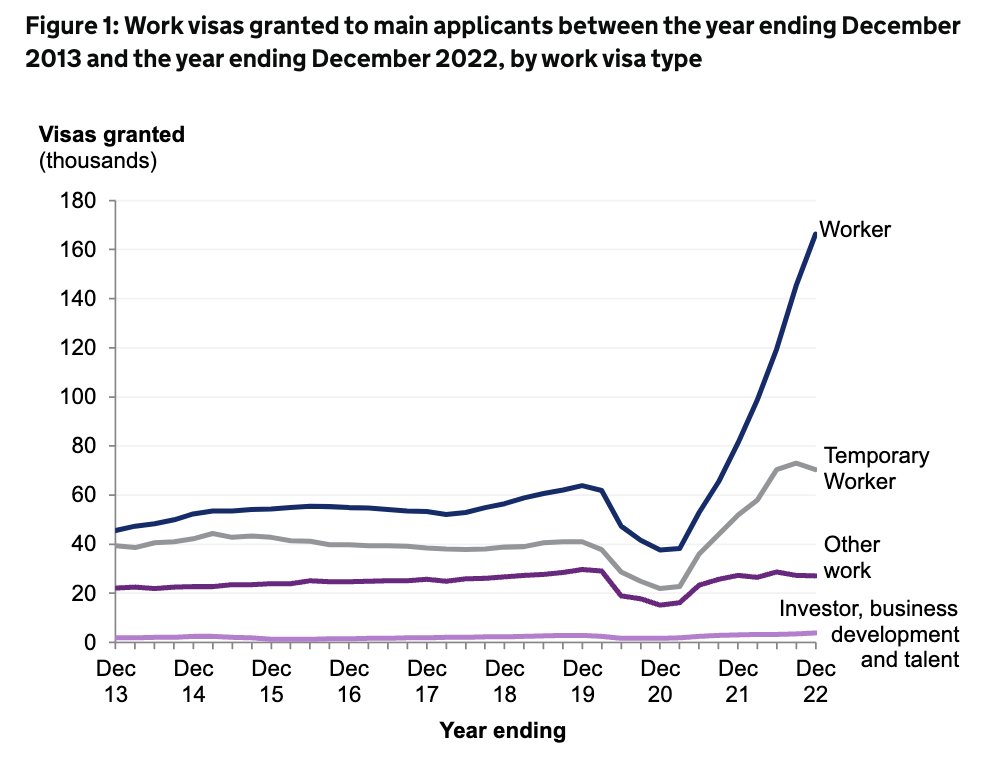

12-13% of people say they would reduce the number of visas for doctors/nurses - but 54-55% favoured increasing the numbers (summer 2022).
17% wanted fewer social care workers - while 45% wanted to see the migrant numbers go up in social care
@IpsosUK
ipsos.com/en-uk/immigrat…
17% wanted fewer social care workers - while 45% wanted to see the migrant numbers go up in social care
@IpsosUK
ipsos.com/en-uk/immigrat…

1 in 5 people did want fewer student visas, but 67% didn't. Here maintaining levels (42%) was more popular than increases (25%). Previous studies show 3/4 of people think international students is a separate issue to migration, and should count this separately. 

The 2022 study numbers to Sept 2022 were 77% up on 2019. Some of it an artificial boost from pandemic disruption in 2020-21. Some may be the success of government strategy to boost numbers & export income (£11 billion in fees + c £15 billion from spending of those living here) 

HEPI 2021 research report suggested £29 billion in income, £3 billion in costs from half a million international students coming to study in the UK
hepi.ac.uk/2021/09/09/int…
hepi.ac.uk/2021/09/09/int…
These were 2014 attitudes by party on whether international students should be allowed to stay to work. UKIP voters were in favour, though with slightly more mixed views & 1/4 Ukippers opposed, with Conservative voters the keenest on post-study work 

Ukippers were more mixed on reducing/not reducing students. (Ukip policy was to take students out of net migraton, being more liberal than T May on that issue). Overall attitudes were considerably less permissive in 2014 when this poll was done. 

One more big new contribution to higher migration in 2021 and 2022: 150,000 BN(O) Hong Kong visas from Jan 2021 to Sept 2022. Was slowing by latter half of 2022, but may be a +75k contributor to record levels of net migration.
Govt is v proud of its choice to open the scheme
Govt is v proud of its choice to open the scheme
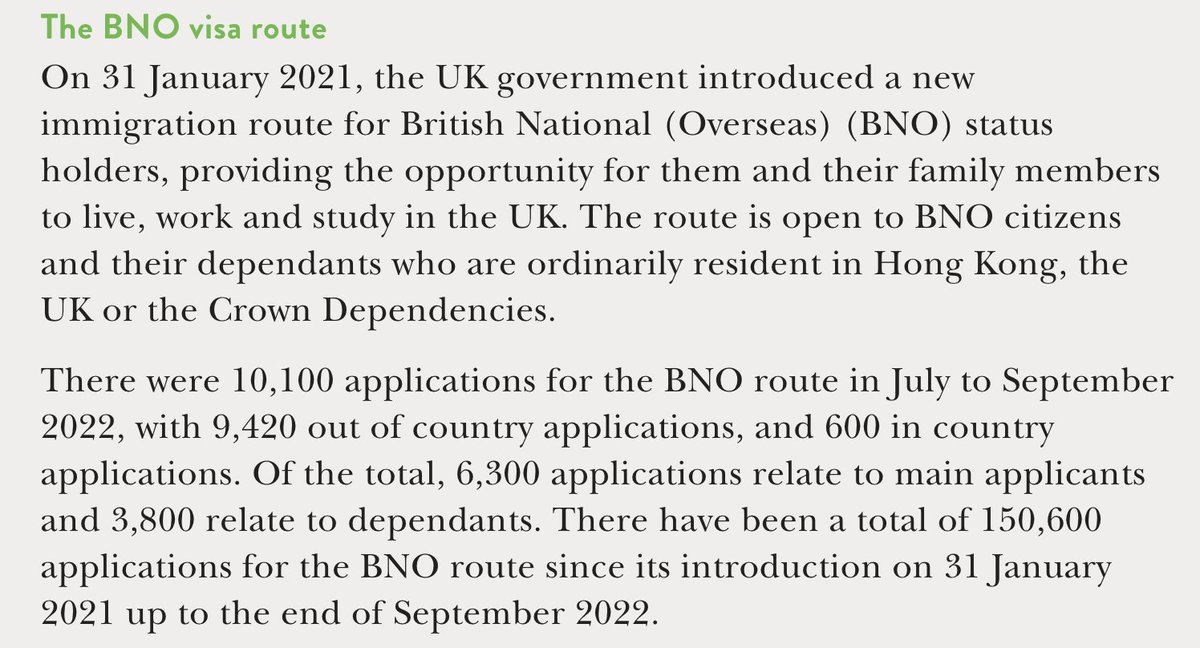
One more contribution to higher migration was temporary seasonal work, after the Johnson government increased the quota from 2500 to 40,000 a year.
commonslibrary.parliament.uk/research-brief…

commonslibrary.parliament.uk/research-brief…
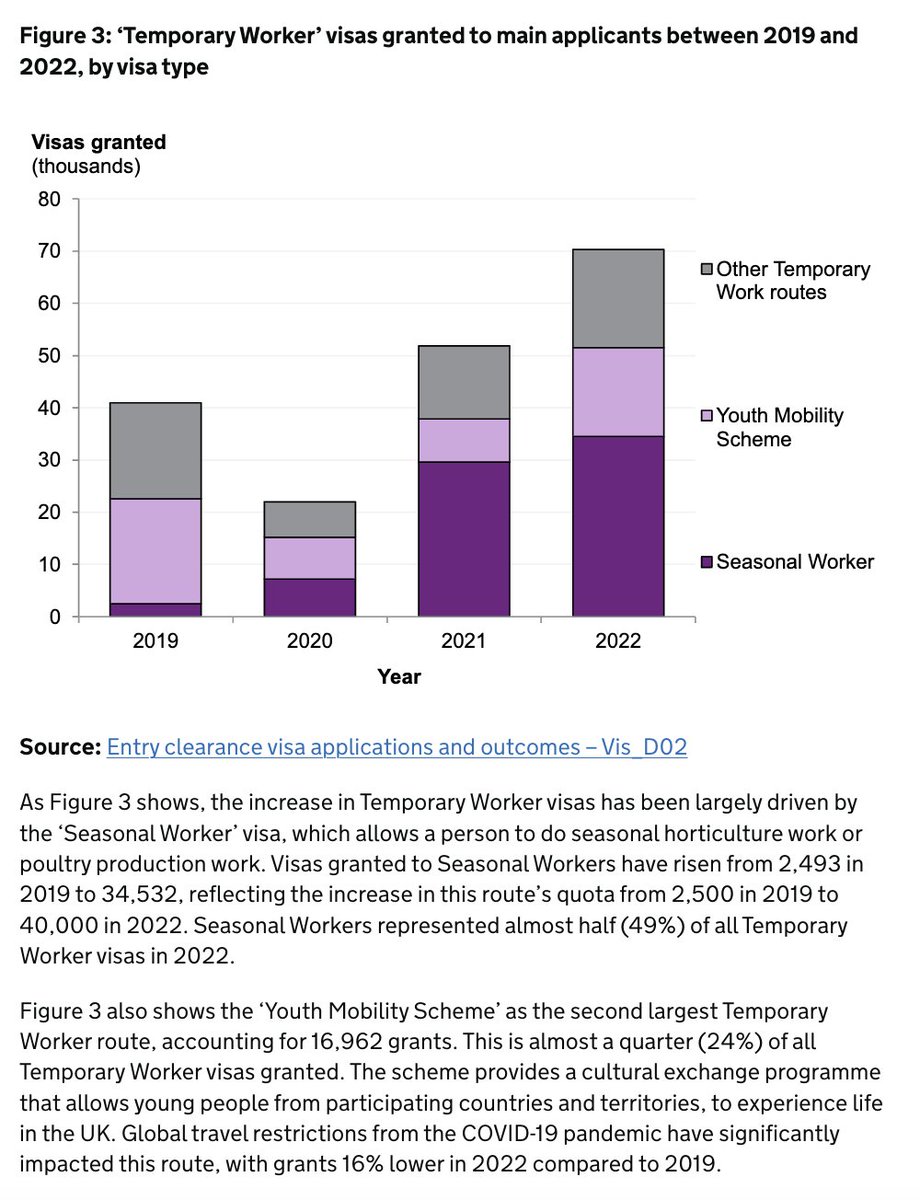
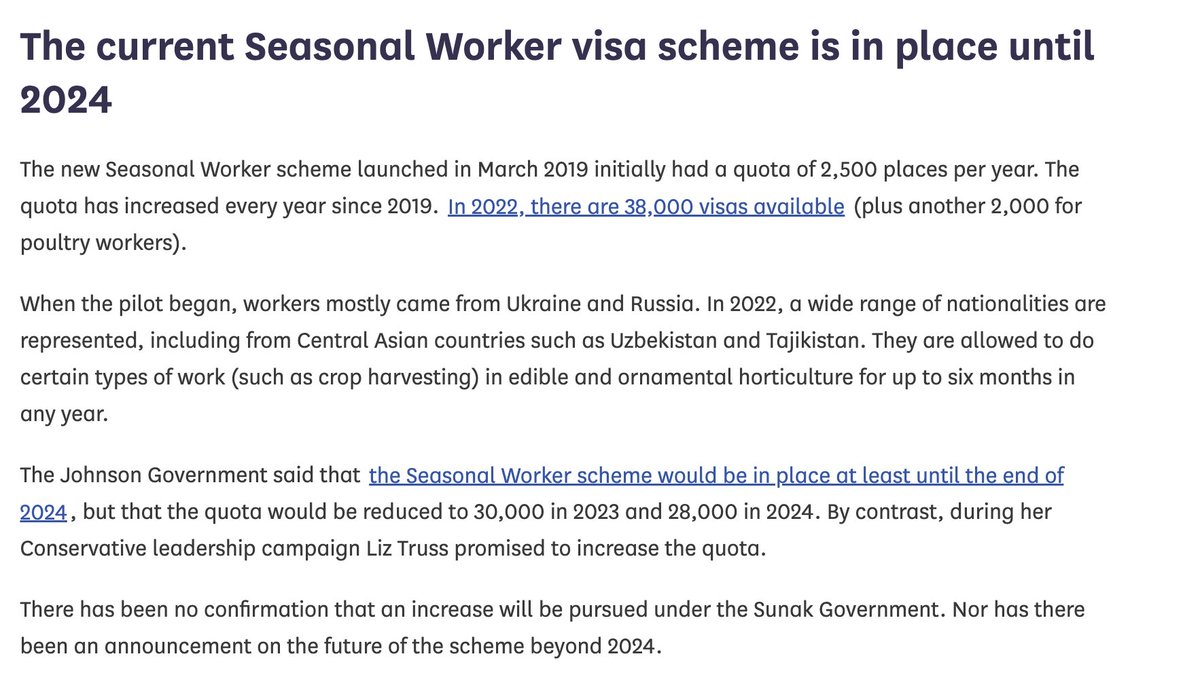
There was a surprisingly dramatic shift in public attitudes on this
By summer 2022, 45% of people wanted more migrant fruit-pickers, while 27% wanted reductions, 27% to maintain levels.
In June 2016, just 9% said increase, 37% (a large minority) wanted reduced numbers

By summer 2022, 45% of people wanted more migrant fruit-pickers, while 27% wanted reductions, 27% to maintain levels.
In June 2016, just 9% said increase, 37% (a large minority) wanted reduced numbers


A rise in asylum applications to 75k in 2022 also contributed, though that remains a small proportion of the 1.3 million people coming to the UK for work, study, family and the BNO/Ukraine visa schemes. 





Obvs, its basic maths that anybody wanting net migration in 2022 to be significantly lower (say 250k, or 100k) would need to have cut numbers of some of Ukranians, or Hong Kongers, or NHS visas, or students.
However all 4 of those flows were popular with govt, MPs & public
However all 4 of those flows were popular with govt, MPs & public
3 options
(1) Promise Reductions + say how
[Braveman?i She hasn't said how. Not did May ever do that]
(2) Cakeism: Say numbers should come down, but bring in policies that increase it
[Johnson/Patel did this, 2019-22; Sunak continues]
(3) Don't promise reductions; manage
(1) Promise Reductions + say how
[Braveman?i She hasn't said how. Not did May ever do that]
(2) Cakeism: Say numbers should come down, but bring in policies that increase it
[Johnson/Patel did this, 2019-22; Sunak continues]
(3) Don't promise reductions; manage

One reason the government is Cakeist on Immigration (Promise to reduce it, but don't do it] is that its voters are Cakeist on Immigration, with 6/10 Conservatives favouring overall reductions, but < 1/3 for any specific proposals on how to reduce work visas 

Because net migration in 2022 exceptionally high for exceptional reasons (Ukraine, Hong Kong), the government can say it expects it to fall in 2023-24
Manifesto pledge was to reduce numbers vs 2019, not to reduce it towards 2019 levels, after big spike
Manifesto pledge was to reduce numbers vs 2019, not to reduce it towards 2019 levels, after big spike
https://twitter.com/sundersays/status/1595803866897199104
This was the Balanced Migration group's proposals for how to achieve net zero migration It seems incredibly thin as a proposal to cut levels of net migration
balancedmigration.com/our-case/
balancedmigration.com/our-case/

My review of 2019 manifestos noted overall numbers were much less prominent theme than in 2010, 2015 or 2017 - but that the Conservatives were still promising that "overall numbers would come down" despite a policy agenda that liberalised non-EU migration
kcl.ac.uk/news/do-the-pa…
kcl.ac.uk/news/do-the-pa…

Attitudes to overall numbers had changed in recent years.
August 2022: 42% wanted overall numbers to come down (a quarter wanted large reductions); 50% didn't want to reduce immigration numbers (a quarter wanted increases).
August 2022: 42% wanted overall numbers to come down (a quarter wanted large reductions); 50% didn't want to reduce immigration numbers (a quarter wanted increases).

How did attitudes shift? Vg FT thread on the different factors.
https://twitter.com/jburnmurdoch/status/1525766106119606273
My thread: different people changed their minds for different reasons
https://twitter.com/sundersays/status/1530851240191868928
Why is there record net migration?
1. Exceptional circs in 2022
- Esp Ukraine (up to 200k)
2. Deliberate choices for more migration, esp by Johnson government: on NHS, Students & post-study, Hong Kong, seasonal work, kept by Sunak/Hunt
3. Broad popularity of specific choices
1. Exceptional circs in 2022
- Esp Ukraine (up to 200k)
2. Deliberate choices for more migration, esp by Johnson government: on NHS, Students & post-study, Hong Kong, seasonal work, kept by Sunak/Hunt
3. Broad popularity of specific choices
4. Jeremy Hunt has used maintaining the higher level of migration to increase forecast growth. Sunak has backed the Chancellor over the Home Secretary on numbers. (Govt expects numbers to come down after 2022, to where it was in 2019)
https://twitter.com/sundersays/status/1636045601648308226
5. The government, while it was committed to reduced migration to net 100k (2010-2019) and to vaguer pledge to reduce (2019-23), never produced any plan for *how*.
It was v rare for advocates of reduced migration to propose how.
It was v rare for advocates of reduced migration to propose how.
https://twitter.com/sundersays/status/1595723704973103104
A plan to reduce migration would need to involve cutting several flows of increased migration for which there was broad public consent (such as Ukraine, students, post-study work, Hong Kong visas, NHS visas, seasonal work). The public are clearly torn on the detail of this.
If Johnson/Patel govt serious about cutting migration (revealed preferences: it was not), could have applied the pre-2016 rules for non-EU to EU and non-EU migration. But v unpopular around Cabinet (esp NHS, Treasury, education, agriculture, social care) & would have hit growth
But this reflects public views!
A quarter of public "sincere reducers"
- Favour large reductions & will the means (except NHS, Ukraine)
A quarter of public are "selective, would be reducers" but their policy preferences are "control, not reduce"
1/5 were for increases in 2022

A quarter of public "sincere reducers"
- Favour large reductions & will the means (except NHS, Ukraine)
A quarter of public are "selective, would be reducers" but their policy preferences are "control, not reduce"
1/5 were for increases in 2022


Little known on expectations: 6/10 people thought a Leave vote would lead to lower immigration (June 2016) yet that quickly fell to 4/10 (by Oct 2016) with 1/2 thinking numbers would remain similar.
https://twitter.com/sundersays/status/1530910784980656128
40-50% of Leave voters did continue to expect reduced migration (with that expectation halving in the few months after the referendum in 2016)
https://twitter.com/sundersays/status/1530912331445714945
Immigration salience has risen (somewhat) in 2023 - polarised argument about asylum and boats, and increased numbers. It remains considerably lower than in 2014-15. The underlying shift in attitudes, and the less one-size-fits-all perceptions clearly contribute to this 

Johnson's government had a "control, not reduce" policy - and dropped the net migration target on day one in July 2019. But as the 2019 election campaign began they made a manifesto pledge - "overall numbers would fall" that the gvt never tried to keep.
qmul.ac.uk/mei/news-and-o…
qmul.ac.uk/mei/news-and-o…

Johnson's "Control Not Reduce" government made decisions on Ukraine, students and post-study, NHS, Hong Kong and seasonal work that the median voter ["Control/Select > Reduce] approves of. But they can't complain at the political/media criticism having made a "Reduce" promise too
Without its failure to reduce immigration government wouldn't be reporting 0.1% growth for last quarter, rather than a recession
Revising the net migration projection to reflect the reality was the main contributor to an inproved growth outlook
Revising the net migration projection to reflect the reality was the main contributor to an inproved growth outlook
https://twitter.com/sundersays/status/1593919418559565824
When net migration is 500k, the rise is mostly an exceptional Ukraine/Hong Kong effect.
If its 700k+ then the exceptional circumstances is more like half of the rise. Student growth strategy & NHS visas also large. + seasonal work & increased asylum (about 40k each)
If its 700k+ then the exceptional circumstances is more like half of the rise. Student growth strategy & NHS visas also large. + seasonal work & increased asylum (about 40k each)
Govt has a political problem - having reintroduced a "reduce" pledge.
Its in their interests to explain composition: esp that they wanted student migration go up (for £28 billion spread across 100 cities & towns); wanted to respond to Ukraine, Hong Kong; & need NHS/care workers
Its in their interests to explain composition: esp that they wanted student migration go up (for £28 billion spread across 100 cities & towns); wanted to respond to Ukraine, Hong Kong; & need NHS/care workers
Deciding what to do about Ukraine refugees; about Hong Kong visas; about NHS and social care visas; about students & post-study work about seasonal work; work visa salary thresholds & whether to set limits = what "control" looks like on migration visas
https://twitter.com/jburnmurdoch/status/1525766111412817920
Next govt should consider more transparency; more parliamentary oversight; and institutionalise efforts to engage the general public in issues of choices, trade-offs, and the pressures and gains of migration and population change. My Prospect piece
prospectmagazine.co.uk/politics/60287…
prospectmagazine.co.uk/politics/60287…
This salience shift 2016-22 is a "control" and "contribution" dividend. 2023 rise in salience reflects visibility of loss of control (asylum); overall numbers may contribute. Salience much more split by party than it was. (This is now much trickier for Cons than Labour in 2023-24 



Conservatives are selective reducers (6/10 want overall reductions, but only 1/4 to 1/3 favour specific reductions)
Two-thirds of Labour voters don't want reductions: the other third are mostly selective controllers, who don't favour specific reductions
Two-thirds of Labour voters don't want reductions: the other third are mostly selective controllers, who don't favour specific reductions
https://twitter.com/sundersays/status/1579937691491176448
• • •
Missing some Tweet in this thread? You can try to
force a refresh



